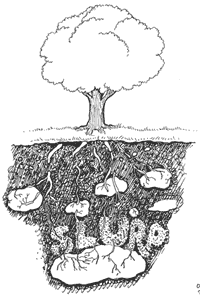STRANGE BUT TRUE- Drinkin' buds: Trees know to suck it up

DRAWING BY DEBORAH DERR McCLINTOCK
Q. What's the weirdest place trees get water from? –T. Lawson
A. "Trees can suck big time, and they can suck water right out of a stone," says Oregon State University forest ecologist Michael Newton. Stones are really quite porous, and tree roots can exert a negative effective "pressure" over 1000 psi, enough to lift a column of water standing twice the height of the Empire State Building. The trees of southern Oregon and western California live through summers with little rain for months and subsist on water from rocks deep in the ground, reaching down 15 feet or more for a drink.
Q. Baseball's been around so long fans can lose sight of just how weird the game can seem to outsiders– to insiders too, if they stop to think about it. –G. Triandos
A. #1: Where else in life can you fail two-thirds of the time yet still be considered an excellent performer, as is a hitter with a .333 batting average (based on MSN "Encarta" of Microsoft). That's 1 hit every 3 tries.
#2: "Stealing" is perfectly okay, with millions of impressionable kids cheering the theft of second base.
#3: If you're not much of a batter, the manager can send in a pinch hitter; if you're slow, a pinch runner can take your place. "At what point, you may wonder, is a team comprised entirely of pinch players."
#4: Rules prevent pitchers from spitting on the ball, but spitting just about anywhere else is fair game.
#5: A batter who walks with the bases loaded is credited with an RBI, even though he didn't hit the ball.
#6: Though the game is played on dirt and grass, if the ball gets dirty it is replaced with a clean one.
#7: If the batter accidentally hits the catcher while swinging, it's the catcher's fault even if he gets injured, and the batter is awarded a base.
#8: The coaches and managers wear the same uniforms as the players.
#9: When a batter is "walked," he jogs to first.
#10: The 7th-inning stretch makes baseball the only sport where spectators take part in calisthenics.
Q. Most of us are "neophiliacs" to one degree or another. What do all these degrees add up to for society? –R. Hughes
A. "Love of the new" is either a blessing or a bane depending on your perspective, says New Scientist magazine. More than 100 million mobile phones were discarded last year, plus tens of millions of computers, electronic games, TVs, monitors– many containing hazardous materials. Yet people want the latest, the hippest, the trendiest. "Planned obsolescence" only feeds into this, good for the economy and pop culture but not for the environment.
Sociologist Colin Campbell identifies three types of neophiliacs: 1. Pristinians have a compulsion for new and clean furniture, clothes, carpets. 2. Trailblazers crave cutting-edge technology. 3. Fickle-fashion consumers, the biggest group, succumb to the lure of advertising. Older folks are less susceptible. Beyond age 23, the window of receptivity closes for clothing, 35 for new music genres, 39 for new foods. Surprisingly, "This is not just a human trait; old animals are not receptive to new foods either."
Q. If you call someone a "birdbrain," who's the real birdbrain? –A. Hale
A. The insult boomerangs right back at you, showing your ignorance about birds, says Mark Davidson in Right, Wrong, and Risky. Considering that canaries and other songbirds learn entirely new melodies each year, "the bird brain has an undeservedly bad reputation," points out Michael Specter. Birds' brains are as complex and inventive as those of any mammal, with crows, parrots and some others exhibiting intelligence comparable to a chimpanzee, as determined by a team of 29 scientists from six countries (Nature Neuroscience Reviews).
For example, a group of carrion crows were seen placing walnuts in a university crosswalk in Japan, then patiently waiting for vehicular traffic to come by and smash the nuts; only after the light changed to stop the traffic, says Davidson, did the crows safely retrieve the food.
Impressed by transcontinental bird migration, Jack Page and Eugene Morton in Lords of the Air marveled at how so diminutive a brain can program into itself such changing environmental data as is garnered on its maiden voyages. "The bird surely deserves the respect of a species that requires a printed map to find its way around a shopping mall."
Send Strange questions to brothers Bill and Rich at [email protected].
#